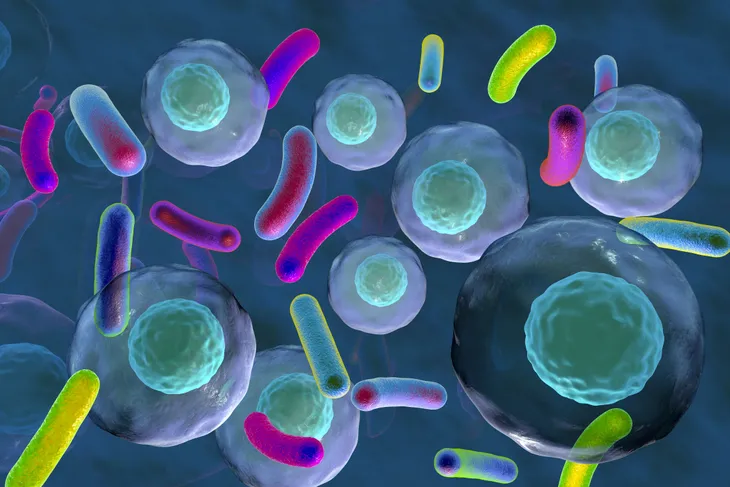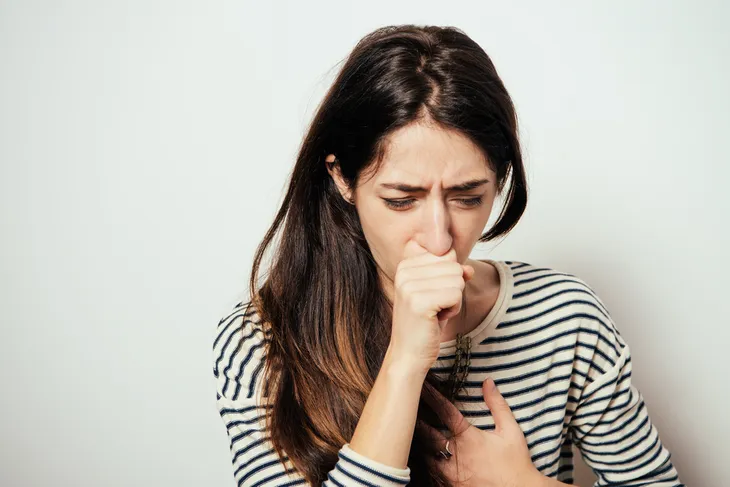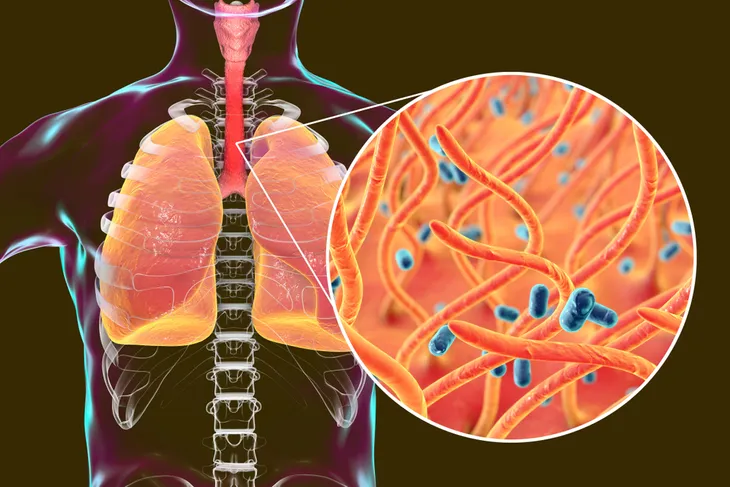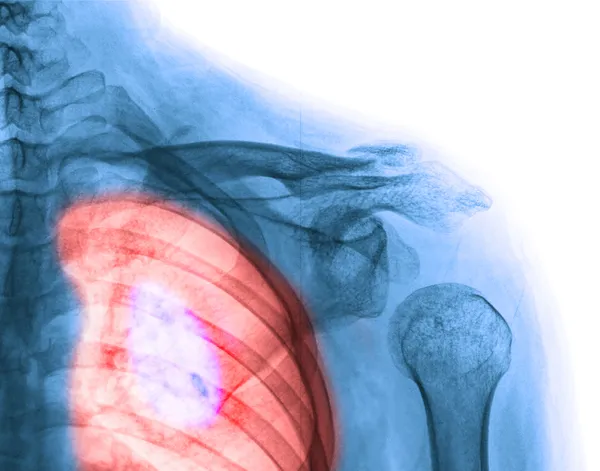So you’ve got a chronic cough, and you’re not sure why. It could be something relatively harmless and easily fixable, or it could be a warning sign of something more serious.
Whatever the reason, continuously coughing is not normal, so you should consider seeing a doctor to get to the root cause. Here are 16 reasons that tickle in your throat or your lung congestion just won’t seem to go away…
Leftover From a Cold or Flu
You’ve kicked your flu or cold, and you think you’re in the clear. However, WebMD explains the most common cause of a chronic cough is actually the aftermath of a cold or another viral infection.
It says your cough can hang around for weeks after your cold symptoms subside, because the virus may have caused your airways to swell and become more sensitive. You may also be suffering from post nasal drip. This common condition associated with the cold and flu causes secretions to drip down the back of the throat. This constant drip causes people to have a sore throat and cough.
Bacterial Infections
The same source explains that successfully battling a cold can “leave behind an unwelcome parting gift,” namely bacteria that more easily invades your raw and irritated airways.
The bacteria can end up resulting in a sinus infection, bronchitis, or pneumonia, it adds. It notes a fever or pain can often accompany these bacterial infections, but luckily antibiotics can clear them up (in most cases, as pneumonia can be viral).
Dehydration
Not getting adequate fluids can lead to a host of potentially serious health problems, but it can also cause you to cough more often when you’re already sick with a cold or flu, adds WebMD.
The source suggests taking in plenty of fluids in the form of water, juice, or soup, to “help loosen mucus in your airways so you can cough it up and out.” It says to avoid alcohol and caffeine when you’re sick, as they can both lead to dehydration. Trying using a saline nasal spray or humidifier to keep your airways hydrated, it adds.
Overuse of Nasal Spray
While we’re on the subject on nasal spray, using too much nasal decongestant can end up making your cough worse, says WebMD. While these types of nasal sprays are effective to a relieve a stuffy nose, you shouldn’t use them for more than 3-days, it says.
WebMD says if you use them long-term and then stop, your symptoms might intensify as a result of a “rebound effect.” The excess spray makes your nasal membranes swell, which in turn leads to more congestion, it warns.
Smoking
This one might seem obvious to many, but if you’re a smoker you may be looking to other reasons why your cough won’t go away. “Smoker’s cough,” as it’s called, is a persistent cough (lasting more than 2 or 3 weeks) that develops in long-term smokers, notes VeryWell Health.
The nature of the cough may change depending on how you’ve smoked, adds the source. For example, those who haven’t smoked for very long may experience a dry cough, while those who have smoked for longer periods of time will experience phlegm, it adds. Smoker’s coughs are usually at their worst in the morning, it says.
Stress
WebMD explains that stress – especially prolonged stress – can make you cough longer when you have a cold. It says that if you’re sick, try to ease off the gas pedal a bit to give yourself a chance to recover. “Pushing yourself too hard might just make you sicker,” it notes.
Meanwhile, several sources say stress can weaken your immune system, which could make you more susceptible to getting a cold or flu to begin with. So try to take it easy, and get proper rest to let your body bounce back daily.
Blood Pressure Medications
Reader’s Digest says your unstoppable cough could be a side effect of blood pressure drugs, specifically ACE inhibitors. It says these drugs can disrupt histamine pathways and inflame airways.
You may still have the cough even if you’ve been taking the medication for a long period of time, so it’s important to let a doctor to sort it out, it says. “You can develop a cough sometimes early on after you start the medication, and sometimes after a number of months,” it reads.
Acid Reflux
Gastroesophageal reflux disease (GERD) is a common condition among Americans (up to 20-percent of the population has it), but it can cause more than heartburn – it can also cause a persistent cough, according to Reader’s Digest.
“Components of acids that are supposed to stay in the stomach come up through the esophagus and trigger a cough from the underside of vocal cords,” explains the source, citing a pulmonologist from Cleveland Clinic.
Low or High Humidity
WebMD says that air that’s too dry or too moist can irritate a cough. Dry air is common in the winter months, which may be why you see people coughing when the thermometer dips low. Cold and dry air also makes it easier for the viruses responsible for flu and colds to travel.
Meanwhile, it says to be careful if you’re using a humidifier indoors to rectify this dry air problem. Too much humidity indoors can encourage growth of mold and dust mites, which commonly cause people to cough and sneeze. It says you should aim for indoor humidity levels around 40 to 50-percent during the extreme cold and hot seasons.
Air Pollution
Not much you can do about this one, aside from moving deep into the countryside (and even then there’s no guarantee.) Health.com points out that various “pollutants and irritants” in the air can trigger a chronic cough.
The source says that even short-term exposure to diesel fumes can cause coughing, phlegm buildup, and irritated lungs. These fumes can also make existing respiratory ailments such as asthma seem worse, it adds.
Allergies and Asthma
We’d be remiss if we didn’t mention that asthma and allergies are two big culprits when it comes to a chronic cough. SELF notes that frequent coughing, especially at night, could be a sign of asthma. (Asthma patients also often make a wheezing noise when they cough, it adds).
There’s a version of asthma called cough-variant asthma that only has 1-symptom – coughing, which can be triggered by pollen, pet dander, dust, mold, cold air, air pollution, perfume, stress, and even exercise, says Self.com. “Allergies and asthma often go hand in hand, with an allergic reaction to a substance triggering asthma symptoms including coughing,” it adds.
Chronic Obstructive Pulmonary Disease
Also known as simply COPD, this condition is commonly caused by smoking, and is described as one that causes the airways and air sacs in the lungs to become inflamed or damaged, says Health.com. The condition causes an overproduction of mucus, and your body tries to rid it through coughing (all the time).
Tissue damage related to COPD can make it harder for your lungs to expel air, which may also make you feel short of breath, adds the source. COPD most commonly affects patients older than 45, it notes.
Pulmonary Fibrosis
This is a common condition among patients who have rheumatoid arthritis – in fact, up to 40-percent of people with this form of arthritis have the secondary problem, according to Reader’s Digest.
“Rheumatoid arthritis is a systemic connective tissue disease, which means it can damage the lungs and lead to persistent coughing,” explains the source. A dry cough that persists for months is a telltale sign of pulmonary fibrosis, it adds.
Pertussis
This condition is also known as whooping cough, a bacterial infection that can cause a low-grade fever, runny nose, and a “violent” cough that can labor your breathing, says Health.com. “Attempting to inhale air into the lungs between coughs can produce a distinctive, high-pitched whooping sound,” it adds.
While the fever can subside after the initial stages of this condition, the related chronic cough can last “for many weeks,” it adds. While this is a relatively uncommon cause of a chronic cough, inadequate vaccination against pertussis in the U.S. (vaccines wear off after about 10-years from infancy) is why “the bacteria are making a comeback,” it explains.
Lung Cancer
This is one of the direr reasons you can’t stop coughing, according to Huffington Post. Although lung cancer is most commonly associated with smoking, those exposed to second-hand smoke can develop it, as can those who are exposed to neither, says the source.
After smoking, the most common cause of lung cancer is radon gas, which can go undetected in homes unless you specifically test for it. Speaking of tests, “Unfortunately, most symptoms of lung cancer do not show up until the later stages of the disease,” it adds. See your doctor if you have a new cough that just won’t quit.
Heart Failure
Your lungs may be trying to tell you that there’s something amiss with your heart through a chronic cough, says Huffington Post. The source cites the American Heart Association, noting you should see a doctor if the cough has certain accompanying symptoms.
Those other warning symptoms, says the source, include shortness of breath, nausea, swelling (due to a buildup of fluid), fatigue or lightheadedness, a fast heartbeat, and even confusion.



















